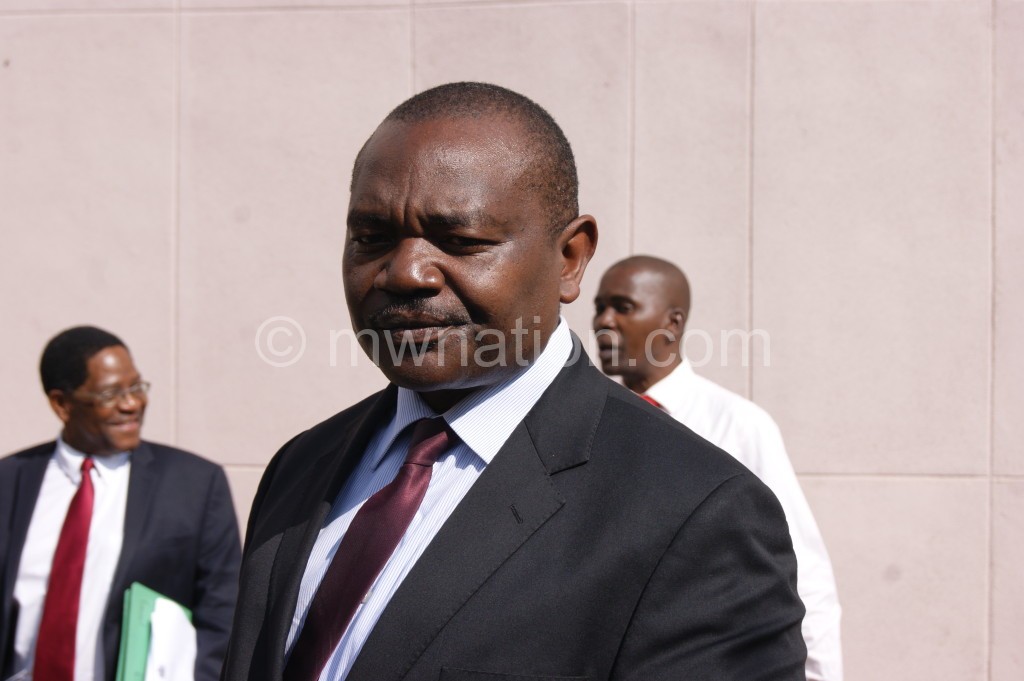AG suffers another blow
Attorney General (AG) Kalekeni Kaphale and his team on Monday suffered another setback after the High Court, sitting as the Constitutional Court in Lilongwe, ruled that opinion evidence is not admissible in court.
As the case entered the third day on Monday , the AG asked first petitioner Saulos Chilima in cross-examination if a 0.22 percentage, which was calculated as cases of intimidation from 5 002 polling centres, would be significant or insignificant, material or immaterial.

The AG asked Chilima, the immediate past vice-president, if he would not have considered that percentage if he were a member of Malawi Electoral Commission (MEC).
Marshal Chilenga, one of Chilima’s lawyers, objected to Kaphale’s line of questioning, arguing opinion evidence is not acceptable.
Bright Theu, another lawyer on Chilima’s legal team, rose and cited case authorities to convince the court that opinion evidence is not acceptable in court.

Lawyers Chikosa Silungwe for Chilima and Alick Msowoya for Malawi Law Society (MLS), appearing as friends of court, also supported the position that opinion evidence is not admissible.
The five-judge panel of Healey Potani, Mike Tembo, Redson Kapindu, Dingiswayo Madise and Ivy Kamanga, adjourned to work on the ruling.
When court resumed, chairperson of the panel, Potani, read the ruling, upholding the objection by Chilima’s lawyers.
This made the AG suffer a second setback after his application to have the matter adjourned at the beginning of the case last week Thursday was also dismissed by the court.
Kaphale asked for the adjournment to enable his team study documents arguing they were served on them late.
Proceeding with the cross-examination, with the AG focusing on the first petitioner’s sworn statement and on bribery allegations, Chilima said Democratic Progressive Party (DPP) member Brown Mpinganjira visited a polling centre and gave money to people who came to vote.
“When he was asked, he said the money was meant for monitors, but this money was given to voters,” Chilima said.
But Kaphale asked if monitors are not supposed to be paid, to which the former vice-president said these are contractual matters and as such they are entitled to pay.
Of 11 sworn statements that are in court to support Chilima’s case, only one mentioned bribery. The AG asked Chilima to calculate what percentage that was to the sworn affidavit, and he came up with a percentage of 0.01, which the AG said was too minimal.
On the issue of presiding officers influencing voters to vote for a particular candidate, Chilima, taking questions from Kaphale, said this affected seven centres, representing a 0.13 percent, which the AG also said was too small.
In cross-examination, Kaphale took Chilima through the issue of unauthorised persons being found in possession of ballot papers, to which Chilima said six centres were affected, and of the 5 002 centres, it gave a percentage of 0.12, which the AG again described as insignificant.
And on arrests of people accused to be in breach of electoral laws, which were three, Kaphale made Chilima confirm that of the 5 002 centres, those arrests gave a 0.06 percent.
The case was adjourned to today, when the AG will continue cross-examining Chilima.
President Peter Mutharika, who was declared by MEC as winner in the presidential race, is the first respondent and the electoral body is the second respondent.
Mutharika, following a notification submitted in court by second petitioner, Malawi Congress Party leader, Lazarus Chakwera, is expected to appear in court to take some questions.
Kaphale, joined by other lawyers, is representing MEC, in his capacity as government’s chief legal adviser.
Chilima’s lawyers last week told the court that MEC failed to discharge its duty and it should, therefore, be considered that no elections that could duly elect a president of Malawi under Presidential and Parliamentary Act (PPA) were conducted.
The two petitioners are arguing that the May 21 Tripartite Elections lacked credibility and must be declared null and void.
The petitioners contend that Mutharika “won a fraudulent election” fraught with irregularities, including alleged stuffing of ballot papers with pre-marked ballots, tampering with election results sheets through correctional fluid called Tippex, and being found in possession of result sheets at home. The case started in the afternoon as the court wanted to allow respondents more time to study documents.





